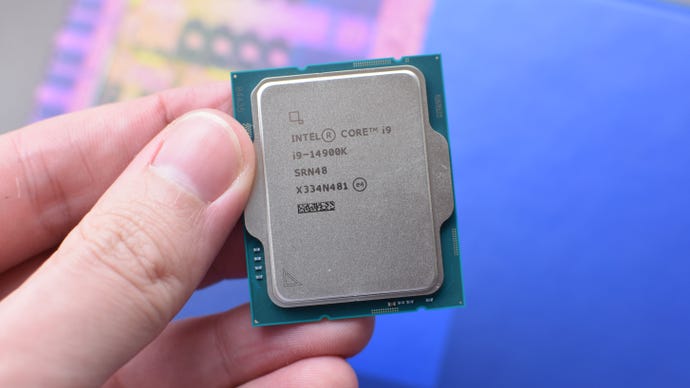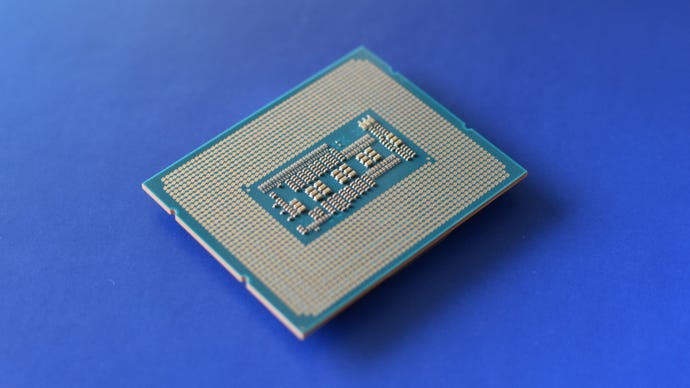False alarm! Intel’s massive batch of recent gaming CPUs for 2023 will not be the architectural overhaul generally known as Meteor Lake. The 14th technology of Core chips is as a substitute codenamed Raptor Lake Refresh, and if the Core i5-14600K and Core i9-14900K are any indication, that comes with an terrible lot extra emphasis on “Raptor Lake” than on “Refresh.”
Watch on YouTube
Exterior of some gentle clock pace will increase and a few new AI-powered doodads for the Core i9-14900K, that is about as conservative a yearly processor improve because it’s doable to think about. The Efficiency and Effectivity cores are primarily the identical {hardware} as they have been within the thirteenth Gen Raptor Lake chips, and people have been themselves barely a step ahead from the transformative Alder Lake collection within the first place. It ought to come as no shock, then, that the gaming efficiency of those 14th Gen CPUs stutters into stagnancy.
That’s to not say that the hybrid P-core/E-core setup has turn out to be previous hat. It’s simply that the one processor within the Raptor Lake Refresh household to get a really bodily improve is the Core i7-14700K, which positive factors 4 extra E-cores over its thirteenth Gen equal. The chips we have now right here, alternatively, hold their counts: the Core i5-14600K will get the identical six P-cores and eight E-cores of the Core i5-13600K, whereas the Core i9-14900K matches the Core i9-13900K’s eight P-cores and 16 E-cores. The brand new i9 can declare the excellence of a lift clock pace that reaches all the best way as much as 6GHz, although we’ve already seen this on the Core i9-13900KS. The Core i5-14600K’s highest doable P-core pace is now 5.3GHz, a nudge upward from its predecessor’s 5.1GHz.
When it comes to plain-and-simple efficiency upgrades, that’s your lot. There’s no enhance to RAM pace limits, no energy effectivity enhancements, and no enhance in directions per clock (IPC), so Intel is de facto relying on these tuned-up clock speeds to get away from Raptor Lake. And, let’s not neglect, its rivals within the AMD Ryzen 7000/7000X3D collection.
There are another function upgrades, however they’re fairly minor, particularly contemplating that the Core i5-14600K lacks the AI smarts of its i9 sibling. Wi-Fi 7 assist is arguably the spotlight, assuming you’ve got an up to date 700 collection motherboard to get it working (I used one among these, the Asus ROG Maximus Z790 Darkish Hero, for my testing).
Earlier than we get into how not-very-successful-at-all this clock pace tactic has been, I ought to clarify that this Core i5-14600K and Core i9-14900K evaluate is serving as a inaugural run of our new CPU benchmarking course of. I’ve retired the Nvidia GeForce RTX 2080 Ti as our graphics card of alternative and subbed in a more moderen, extra highly effective RTX 4070 Ti; this could minimize the probabilities of GPU bottlenecking getting in the best way of truthful CPU-reliant outcomes. This can naturally require re-testing beforehand reviewed chips with the brand new card, and since time was quick and AMD samples weren’t instantly at hand, the outcomes are primarily a 14th Gen versus thirteenth Gen kind deal. No must remark, I do know that isn’t perfect, however I used to be at EGX most of final week and it might have appeared extraordinarily bizarre if I used to be pulling the check rig across the present flooring in a cart.
Anway! 1080p gaming benchmarks, go:
Seems we don’t even want AMD outcomes all that a lot – Raptor Lake Refresh’s lack of significant progress signifies that the Core i5-14600K and Core i9-14900K aren’t even clearly higher buys than their last-gen variations, not to mention something newer and Ryzen-badged. Averaged throughout all ten video games, the Core i5-14600K is a paltry 1.7% sooner than the Core i5-13600K, and the Core i9-14900K is simply 0.4% sooner than its predecessor. In a number of instances, they have been even a number of frames per second slower than the thirteenth Gen variations – I’d say this was margin of error territory, however these scores didn’t enhance with repeated benchmark runs.
It additionally issues little that the Core i5-14600K misses out on the Core i9-14900K’s further, AI-based efficiency boosters, as these grow to be duds as nicely. The primary, a brand new model of Intel Software Optimization, is meant to tweak how the CPU handles app sources, dashing up that particular app with out asking extra of the CPU’s personal cores. Sadly, it solely works with two video games thus far – Rainbow Six Siege and Metro Exodus – and within the latter, it solely received that preliminary 151fps outcome to 152fps. Not likely well worth the effort of burrowing into the BIOS to allow it.

The second is AI Help, which makes use of machine studying to serve up a one-click overclock perform that’s a tad smarter about altering ratios and sustaining stability than Auto OC instruments often are. In equity, this efficiently averted pushing the Core i9-14900K too far – its P-core temperatures peaked at 82°c whereas working video games, nicely inside protected limits – however AI Help additionally failed to supply important efficiency positive factors. Metro Exodus didn’t shift in any respect, nonetheless averaging 151fps, whereas Cyberpunk 2077 solely landed 163fps (2fps larger) and Horizon Zero Daybreak scored 191fps (3fps larger). It’s perhaps price making an attempt for those who’ve received a sufficiently heat-sucking CPU cooler, however doesn’t make up for this technology’s lack of efficiency headway.
In reality, the one metric that’s on an upwards trajectory is temperature. The Core i5-14600K, specifically, runs hotter than the Core i5-13600K: underneath a Asus ROG Ryujin II 360 watercooler, the brand new mannequin’s P-cores peaked at 67°c whereas gaming, up from 58°c. Within the Cinbench R20 benchmark, which stresses CPUs much more, its 80°c peak was additionally significantly hotter than the Core i5-13600K’s 70°c.
The Core i9-14900K fared higher: its gaming peak of 76°c was really so much higher than the 98°c I as soon as recorded on the Core i9-13900K. In Cinebench, nonetheless, it was the newer i9 that extra generally hit the 100°c ceiling, with its E-cores additionally registering a toasty 85°c.
Talking of Cinebench, at the least Raptor Lake Refresh doesn’t take any steps backward on multitasking and common desktop zippiness, with the Core i9-14900K’s single and multi-core methods forming the very best on report. Solely simply, however nonetheless.
There’s additionally at the least one profit to Intel’s low-key refresh method, in that 14th gen chips can fairly fortunately slot into the LGA 1700 sockets of older 600 and 700 collection motherboards – not simply the brand new ones with Wi-Fi 7. Though instantly “upgrading” from an Alder Lake or Raptor Lake chip to one among these CPUs can be insanity, the backwards compatibility does allow these seeking to swap from a a lot creakier processor/mobo combo to take action with out splashing extra cash on a model new chipset. Not like the Ryzen 7000 collection, Raptor Lake Refresh maintains DDR4 RAM assist too, additional enabling extra budget-friendly builds.

However then, if saving cash is a priority, you will get virtually equivalent efficiency from a thirteenth Gen CPU, that are certainly set for value drops now that their replacements are out. The twelfth Gen household stands up in video games and is cheaper nonetheless, and even for those who are keen to splurge the highest of the road, the Ryzen 9 7900X3D is out there for £500 / $499. That is £80, or $99, lower than the Core i9-14900K.
Not each Intel technology must be an entire rework, however the Core i5-14600K and Core i9-14900K don’t even really feel like they actually refine the structure they needed to work with. They’re hotter with out being sooner, and their sole innovation is a set of AI options with slim availability and doubtful efficacy. I wouldn’t trouble, particularly with the far better promise of Meteor Lake on the horizon.

